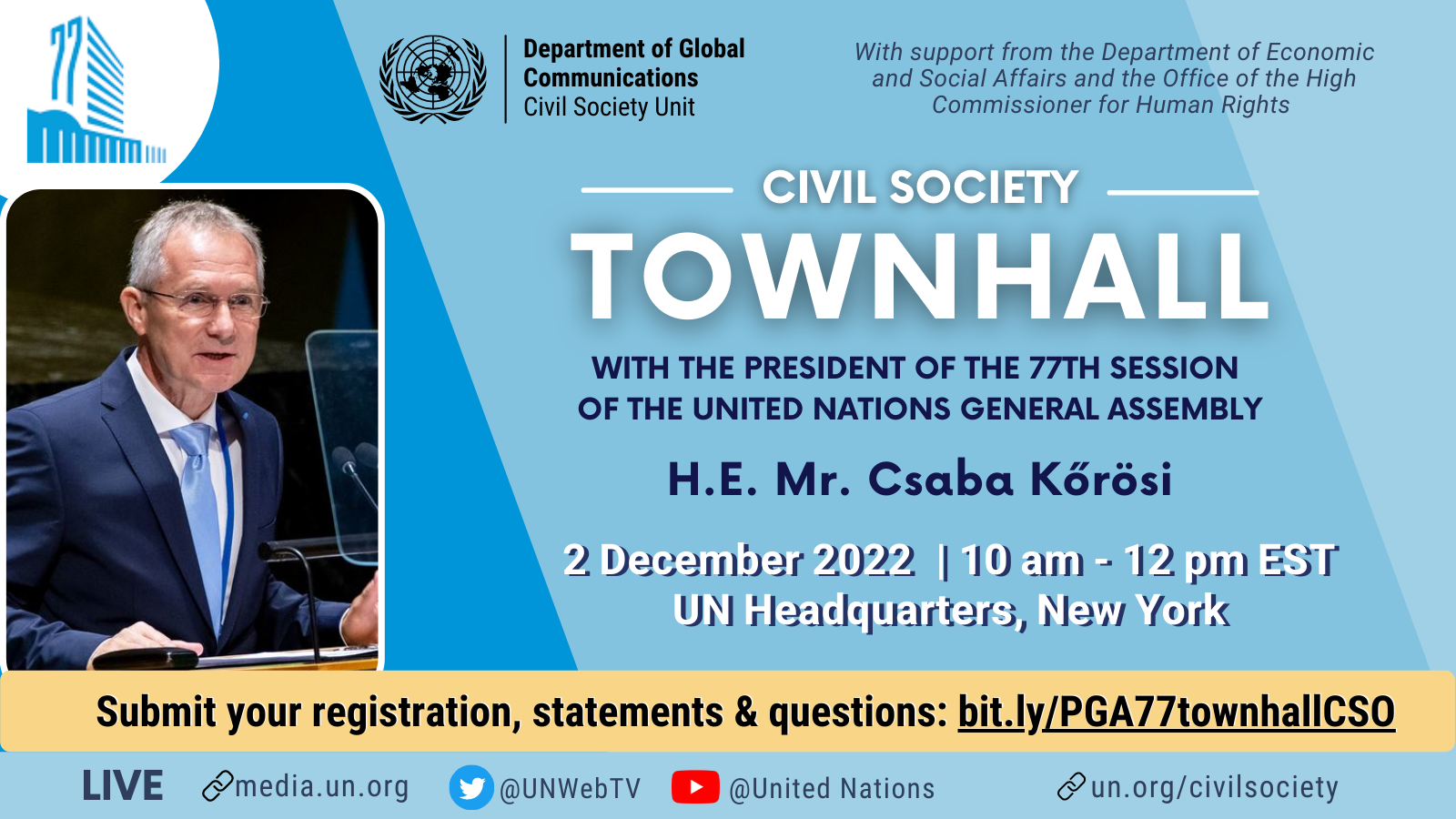
Objectives
In his vision statement, His Excellency Csaba KŐRÖSI, President of the seventy-seventh session of the General Assembly stated “It is my intention to hold impact-oriented consultations with civil society organizations, youth representatives, science-based knowledge centres and representatives of business communities, key finance institutions and faith-based organizations. I hope to be able to encourage them to bring their contributions to the General Assembly while keeping in mind the interlinked nature of the risk factors we face and the integrated character of the solutions we need.”
The PGA has further asserted that a more effective and responsive United Nations will require engagement with an array of relevant stakeholders, including civil society, businesses, philanthropic organizations, academia, the scientific community, and other partners on the key issues under discussion in the General Assembly. While Member States remain the decision-makers of the United Nations, all stakeholders must assume their role as decision-shapers.
In this light, the PGA will convene a Town Hall with civil society representatives to discuss his priorities for the seventy-seventh session, with a particular aim to hear proposals for solutions directly from civil society representatives. This Town Hall is supported by the Department of Global Communications, with additional support by the Department of Economic and Social Affairs and the Office of the High Commissioner for Human Rights.
Format
The Town Hall Meeting will be held in person on Friday, 2 December 2022, from 10:00 a.m. to 12:00 p.m., in the Trusteeship Council Chamber, United Nations Headquarters in New York. The meeting will be webcast live on UN WebTV. The moderated event will consist of an opening statement by the President of the General Assembly followed by five short keynote statements from civil society representatives that will address the following topics:
· Solutions through solidarity: The pandemic has demonstrated how solidarity within societies and among countries has an impact on social and economic stability and security. In times of crisis, focusing on the needs of the poorest and most vulnerable is more important than ever. Civil society is on the ground. What does sustainable solidarity look like?
· Solutions through sustainability: We must get back on track to achieve the Sustainable Development Goals by 2030. Next year’s SDG Summit at the UN will be a key opportunity to take stock of gaps and recommit to the achievement of the SDGs. Best practices that can be replicated are needed. Civil society will play a key role in this endeavor.
· Solutions though science: Our efforts to tackle global challenges such as climate change, biodiversity loss, the coronavirus disease (COVID-19) pandemic and the digital revolution have provided us with convincing proof of the role science can play in shaping decisions on complex issues. This transformative agenda must be based on scientific evidence and the political wisdom of negotiators.
· Solutions from youth: It would be difficult to fix present crises and prevent new ones while adhering to the same mentality and logic that led to their onset. Youth already have a voice, but they need to be heard, particularly as every negotiating process affects them and future generations. In September, the General Assembly decided to establish a UN Youth Office to promote meaningful, inclusive and effective engagement of youth and youth-led organizations in the work of the UN.
· Solutions through partnership: In times of interlocking crises, no country —without exception— can effectively address global challenges alone. Similarly, the complexities of these problems make it so that governments alone, even when working together, are unable to sustainably implement solutions without partnerships that reach beyond the State. Civil society participants are critical partners in highlighting best practices and lessons learned so that partnerships become the international default when addressing common threats.
The floor will then be opened for discussion and for questions from civil society representatives.
Logistics
Civil Society Organizations in consultative status with ECOSOC, formally associated with the Department of Global Communications, and other stakeholders are invited to attend the meeting in the Trusteeship Council Chamber in person.
All in-person participants are required to register in advance here.
For in-person events at the UN headquarters, the use of masks is strongly encouraged.
By registering to attend in-person, all participants attest that their COVID-19 vaccination record is up to date to access the UN Headquarters complex in New York, based on the guidelines provided by local health authorities. Civil Society Representatives are reminded to carry proof of COVID-19 vaccination while on UN premises in New York and must be prepared to show them if requested to do so by UN personnel.
Keynote statements on the solutions may be delivered in person or by pre-recorded video. To register an interest in delivering a keynote statement, please fill in the online form here no later than 14 November. CSO representatives will be selected by taking into account geographical and gender balance, as well as thematic diversity.
Due to time limitations, it will not be possible to accommodate all requests for interventions. A limited number of speakers will be contacted by the Secretariat. We appreciate your understanding. The time for interventions will be limited to 4 minutes for each speaker.
To ensure a wider participation from all geographical regions, CSO representatives will also have the opportunity to submit pre-recorded questions, a selection of which will be presented during the questions and answers segment of the event. Please register your interest in submitting a pre-recorded question here no later than 14 November.
